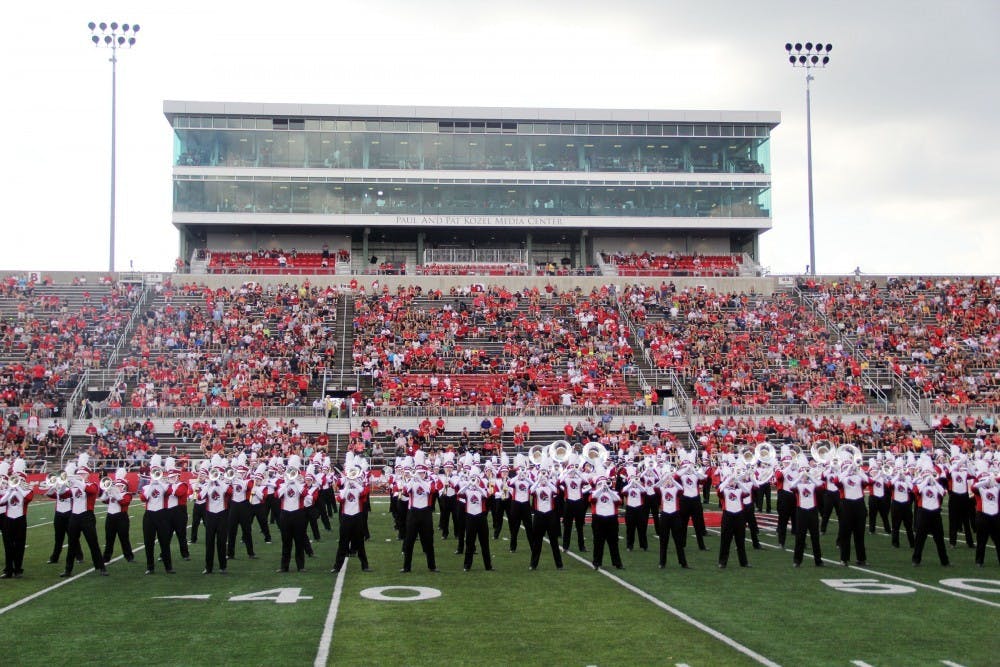Top 5 single game home attendance numbers since 2014
- Indiana State - Sept. 13, 2014 (15,860)
- Tennessee Tech - Sept. 16, 2017 (14,265)
- University Alabama-Birmingham - Sept. 9, 2017 (11,555)
- Western Michigan - Oct. 11, 2014 (11,237)
- Eastern Kentucky - Sept. 17, 2016 (10,902)
Scheumann Stadium's reported attendance was 14,265 people during Ball State football’s family weekend win against Tennessee Tech.
That’s the largest recorded attendance in over three years for the program, second to the 15,860 fans who turned out to see Ball State play Indiana State in 2014. Ball State’s home opener against The University of Alabama-Birmingham had 11,555 fans in attendance — a number that sits third on the list during the three-year span.
While neither of those are close to Scheumann Stadium's top 12 record numbers of more than 20,000 fans per game, there’s been a notable attendance increase from the Cardinals first two home games this season.
“Yes, we’ve definitely seen an increase in the home attendance throughout these first two home games,” Shawn Sullivan, assistant athletics director for marketing and fan engagement said. “We’ve been promoting family weekend to the freshman orientation parents, guardians or whoever brought their students here about family weekend.”
Early promotion along with the increased advertisement from Ball State sports to the Muncie community is something that Sullivan said has increased attendance early on this season.
Combined the first two games of the 2017 season brought in 25,820 fans, more than each of the previous three seasons’ first two home games.
Average attendance at Ball State football games has been decreasing since 2013, a season where the Cardinals went 10-3 overall and set the seventh largest season home attendance in school history.
RELATED: Empty Nest: Ball State working to increase attendance at football games
While Sullivan is pleased in the slight rise in the overall number of fans at Scheumann Stadium early on this season, there’s still one major market that he wants to hit.
“It really comes down to the students,” Sullivan said. “We still don’t have the number of students we’d like to see out at the games. We can get them out to the tailgate lots but we can’t seem to get them into the game.
“We really need our students to get into the game, be loud and provide an atmosphere for our football team.”
Ball State isn’t the only Mid-American Conference teams seeing a rise in early season attendance. Conference rivals Northern Illinois, Kent State and Akron, who all ranked in the last six FBS schools in terms of average attendance last season, have also seen upticks in home attendance through the first couple games of the regular season.
Last season, MAC schools averaged 16,062 fans per game, dead last among FBS conferences — Ball State finished last overall in the FBS averaging 7,789 fans per game.
If Ball State maintained the two-game average of 12,910 fans per game, their overall home attendance ranking wouldn’t go up too much, placing them at ninth in the conference compared to last year's numbers.
But maintaining these attendance numbers in the MAC have proven to be difficult, especially during conference play, where many of the games are played on weekdays instead of Saturdays.
In the past three seasons, Ball State’s midweek attendance game high came against Northern Illinois in 2014 where 6,642 fans came to Scheumann Stadium. Still, Sullivan is hopeful for further success throughout the season, even during midweek games, which are nationally televised.
“All of the midweek games [this season] have 7 o’clock start times, so that helps us out a lot,” Sullivan said. “There’s no ridiculously late start times like we’ve had in the past. … Hopefully people will want to come see top-notch Division l football for a reasonable price.”
This season’s midweek home conference slate includes two Thursday games against Toledo (Oct. 26) and Buffalo (Nov. 16), along with a Tuesday game against Miami (Nov. 21).
Ball State’s final Saturday home game will be homecoming against Central Michigan University on Oct. 21, where students from nearly 60 middle schools will receive a pair of free tickets in part of completing Charlie’s Reading Challenge.





